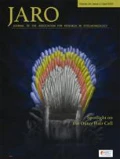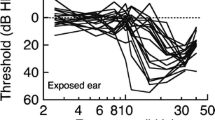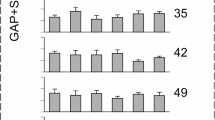Abstract
Laboratory studies often rely on a damaging sound exposure to induce tinnitus in animal models. Because the time course and ultimate success of the induction process is not known in advance, it is not unusual to maintain sound-exposed animals for months while they are periodically assessed for behavioral indications of the disorder. To demonstrate the importance of acoustic environment during this period of behavioral screening, sound-exposed rats were tested for tinnitus while housed under quiet or constant noise conditions. More than half of the quiet-housed rats developed behavioral indications of the disorder. None of the noise-housed rats exhibited tinnitus behavior during 2 months of behavioral screening. It is widely assumed that the “phantom sound” of tinnitus reflects abnormal levels of spontaneous activity in the central auditory pathways that are triggered by cochlear injury. Our results suggest that sustained patterns of noise-driven activity may prevent the injury-induced changes in central auditory processing that lead to this hyperactive state. From the perspective of laboratory studies of tinnitus, housing sound-exposed animals in uncontrolled noise levels may significantly reduce the success of induction procedures. From a broader clinical perspective, an early intervention with sound therapy may reduce the risk of tinnitus in individuals who have experienced an acute cochlear injury.








Similar content being viewed by others
References
Aazh H, McFerran D, Salvi R, Prasher D, Jastreboff M, Jastreboff P (2014) Insights from the First International Conference on hyperacusis: causes, evaluation, diagnosis and treatment. Noise Health 16(69):123–126. https://doi.org/10.4103/1463-1741.132100
Brotherton H, Plack CJ, Maslin M, Schaette R, Munro KJ (2015) Pump up the volume: could excessive neural gain explain tinnitus and hyperacusis? Audiol Neurootol 20(4):273–282. https://doi.org/10.1159/000430459
Brown MC, Ledwith JV 3rd (1990) Projections of thin (type-II) and thick (type-I) auditory-nerve fibers into the cochlear nucleus of the mouse. Hear Res 49(1-3):105–118. https://doi.org/10.1016/0378-5955(90)90098-A
Brozoski TJ, Bauer CA (2005) The effect of dorsal cochlear nucleus ablation on tinnitus in rats. Hear Res 206(1-2):227–236. https://doi.org/10.1016/j.heares.2004.12.013
Brozoski TJ, Bauer CA (2016) Animal models of tinnitus. Hear Res 338:88–97. https://doi.org/10.1016/j.heares.2015.10.011
Brozoski TJ, Bauer CA, Caspary DM (2002) Elevated fusiform cell activity in the dorsal cochlear nucleus of chinchillas with psychophysical evidence of tinnitus. J Neurosci 22(6):2383–2390
Brozoski TJ, Wisner KW, Sybert LT, Bauer CA (2012) Bilateral dorsal cochlear nucleus lesions prevent acoustic-trauma induced tinnitus in an animal model. J Assoc Res Otolaryngol 13(1):55–66. https://doi.org/10.1007/s10162-011-0290-3
Cai S, Ma WL, Young ED (2009) Encoding intensity in ventral cochlear nucleus following acoustic trauma: implications for loudness recruitment. J Assoc Res Otolaryngol 10(1):5–22. https://doi.org/10.1007/s10162-008-0142-y
Canlon B, Fransson A (1995) Morphological and functional preservation of the outer hair cells from noise trauma by sound conditioning. Hear Res 84(1-2):112–124. https://doi.org/10.1016/0378-5955(95)00020-5
Caspary DM, Llano DA (2017) Auditory thalamic circuits and GABAA receptor function: putative mechanisms in tinnitus pathology. Hear Res 349:197–207
Doucet JR, Lenihan NM, May BJ (2009) Commissural neurons in the rat ventral cochlear nucleus. J Assoc Res Otolaryngol 10(2):269–280. https://doi.org/10.1007/s10162-008-0155-6
Eggermont JJ (2017) Effects of long-term non-traumatic noise exposure on the adult central auditory system. Hearing problems without hearing loss. Hear Res 352:12–22
Eggermont JJ (2017) Acquired hearing loss and brain plasticity. Hear Res 343:176–190. https://doi.org/10.1016/j.heares.2016.05.008
Fournier P, Hebert S (2013) Gap detection deficits in humans with tinnitus as assessed with the acoustic startle paradigm: does tinnitus fill in the gap? Hear Res 295:16–23. https://doi.org/10.1016/j.heares.2012.05.011
Gourevitch B, Edeline JM, Occelli F, Eggermont JJ (2014) Is the din really harmless? Long-term effects of non-traumatic noise on the adult auditory system. Nat Rev Neurosci 15(7):483–491. https://doi.org/10.1038/nrn3744
Heeringa AN, van Dijk P (2016) The immediate effects of acoustic trauma on excitation and inhibition in the inferior colliculus: a Wiener-kernel analysis. Hear Res 331:47–56. https://doi.org/10.1016/j.heares.2015.10.007
Heffner HE, Harrington IA (2002) Tinnitus in hamsters following exposure to intense sound. Hear Res 170(1-2):83–95. https://doi.org/10.1016/S0378-5955(02)00343-X
Irvine DR, Rajan R (1996) Injury- and use-related plasticity in the primary sensory cortex of adult mammals: possible relationship to perceptual learning. Clin Exp Pharmacol Physiol 23(10-11):939–947. https://doi.org/10.1111/j.1440-1681.1996.tb01146.x
Jastreboff PJ (2015) 25 years of tinnitus retraining therapy. HNO 63(4):307–311. https://doi.org/10.1007/s00106-014-2979-1
Jastreboff PJ, Sasaki CT (1994) An animal model of tinnitus: a decade of development. Am J Otol 15(1):19–27
Jones A, May BJ (2017) Improving the reliability of tinnitus screening in laboratory animals. J Assoc Res Otolaryngol 18(1):183–195. https://doi.org/10.1007/s10162-016-0597-1
Kaltenbach JA, Godfrey DA (2008) Dorsal cochlear nucleus hyperactivity and tinnitus: are they related? Am J Audiol 17(2):S148–S161. https://doi.org/10.1044/1059-0889(2008/08-0004)
Kaltenbach JA, McCaslin DL (1996) Increases in spontaneous activity in the dorsal cochlear nucleus following exposure to high intensity sound: a possible neural correlate of tinnitus. Aud Neurosci 3(1):57–78
Kaltenbach JA, Zacharek MA, Zhang J, Frederick S (2004) Activity in the dorsal cochlear nucleus of hamsters previously tested for tinnitus following intense tone exposure. Neurosci Lett 355(1-2):121–125. https://doi.org/10.1016/j.neulet.2003.10.038
Kelly JB, Masterton B (1977) Auditory sensitivity of the albino rat. J Comp Physiol Psychol 91(4):930–936. https://doi.org/10.1037/h0077356
Klump GM, Dooling RJ, Fay RR, Stebbins WC (eds) (1995) Methods in comparative acoustics. Birkhauser Verlag, Basel
Kraus KS, Ding D, Jiang H, Lobarinas E, Sun W, Salvi RJ (2011) Relationship between noise-induced hearing-loss, persistent tinnitus and growth-associated protein-43 expression in the rat cochlear nucleus: does synaptic plasticity in ventral cochlear nucleus suppress tinnitus? Neuroscience 194:309–325. https://doi.org/10.1016/j.neuroscience.2011.07.056
Lauer AM, May BJ, Hao ZJ, Watson J (2009) Analysis of environmental sound levels in modern rodent housing rooms. Lab Anim (NY) 38(5):154–160. https://doi.org/10.1038/laban0509-154
Li Y, Ropp TJ, May BJ, Young ED (2015) Dorsal Cochlear nucleus of the rat: representation of complex sounds in ears damaged by acoustic trauma. J Assoc Res Otolaryngol 16(4):487–505. https://doi.org/10.1007/s10162-015-0522-z
Ma WL, Hidaka H, May BJ (2006) Spontaneous activity in the inferior colliculus of CBA/J mice after manipulations that induce tinnitus. Hear Res 212(1-2):9–21. https://doi.org/10.1016/j.heares.2005.10.003
Ma WL, Young ED (2006) Dorsal cochlear nucleus response properties following acoustic trauma: response maps and spontaneous activity. Hear Res 216-217:176–188. https://doi.org/10.1016/j.heares.2006.03.011
May BJ, Lauer AM, Roos MJ (2011) Impairments of the medial olivocochlear system increase the risk of noise-induced auditory neuropathy in laboratory mice. Otol Neurotol 32(9):1568–1578. https://doi.org/10.1097/MAO.0b013e31823389a1
May BJ, Little N, Saylor S (2009) Loudness perception in the domestic cat: reaction time estimates of equal loudness contours and recruitment effects. J Assoc Res Otolaryngol 10(2):295–308. https://doi.org/10.1007/s10162-009-0157-z
Middleton JW, Kiritani T, Pedersen C, Turner JG, Shepherd GM, Tzounopoulos T (2011) Mice with behavioral evidence of tinnitus exhibit dorsal cochlear nucleus hyperactivity because of decreased GABAergic inhibition. Proc Natl Acad Sci U S A 108(18):7601–7606. https://doi.org/10.1073/pnas.1100223108
Munguia R, Pienkowski M, Eggermont JJ (2013) Spontaneous firing rate changes in cat primary auditory cortex following long-term exposure to non-traumatic noise: tinnitus without hearing loss? Neurosci Lett 546:46–50. https://doi.org/10.1016/j.neulet.2013.04.048
Ngan EM, May BJ (2001) Relationship between the auditory brainstem response and auditory nerve thresholds in cats with hearing loss. Hear Res 156(1-2):44–52. https://doi.org/10.1016/S0378-5955(01)00264-7
Ngodup T, Goetz JA, McGuire BC, Sun W, Lauer AM, Xu-Friedman MA (2015) Activity-dependent, homeostatic regulation of neurotransmitter release from auditory nerve fibers. Proc Natl Acad Sci U S A 112(20):6479–6484. https://doi.org/10.1073/pnas.1420885112
Norena AJ (2011) An integrative model of tinnitus based on a central gain controlling neural sensitivity. Neurosci Biobehav Rev 35(5):1089–1109. https://doi.org/10.1016/j.neubiorev.2010.11.003
Norena AJ, Eggermont JJ (2005) Enriched acoustic environment after noise trauma reduces hearing loss and prevents cortical map reorganization. J Neurosci 25(3):699–705. https://doi.org/10.1523/JNEUROSCI.2226-04.2005
Norena AJ, Eggermont JJ (2006) Enriched acoustic environment after noise trauma abolishes neural signs of tinnitus. Neuroreport 17(6):559–563
Oertel D, Young ED (2004) What’s a cerebellar circuit doing in the auditory system? Trends Neurosci 27(2):104–110. https://doi.org/10.1016/j.tins.2003.12.001
Perkins RE, Morest DK (1975) A study of cochlear innervation patterns in cats and rats with the Golgi method and Nomarkski Optics. J Comp Neurol 163(2):129–158. https://doi.org/10.1002/cne.901630202
Phillips DP, Carr MM (1998) Disturbances of loudness perception. J Am Acad Audiol 9:371–379
Rabinowitz PM (2012) The public health significance of noise-induced hearing loss. In: Le Prell CG, Henderson D, Fay RR, Popper AN (eds) Noise-induced hearing loss: scientific advances. Springer, New York, pp 13–26. https://doi.org/10.1007/978-1-4419-9523-0_2
Robertson D, Bester C, Vogler D, Mulders WH (2013) Spontaneous hyperactivity in the auditory midbrain: relationship to afferent input. Hear Res 295:124–129. https://doi.org/10.1016/j.heares.2012.02.002
Ropp TJ, Tiedemann KL, Young ED, May BJ (2014) Effects of unilateral acoustic trauma on tinnitus-related spontaneous activity in the inferior colliculus. J Assoc Res Otolaryngol 15(6):1007–1022. https://doi.org/10.1007/s10162-014-0488-2
Salvi RJ, Wang J, Ding D (2000) Auditory plasticity and hyperactivity following cochlear damage. Hear Res 147(1-2):261–274. https://doi.org/10.1016/S0378-5955(00)00136-2
Schaette R, Kempter R (2006) Development of tinnitus-related neuronal hyperactivity through homeostatic plasticity after hearing loss: a computational model. Eur J Neurosci 23(11):3124–3138. https://doi.org/10.1111/j.1460-9568.2006.04774.x
Schwartz P, Leyendecker J, Conlon M (2011) Hyperacusis and misophonia: the lesser-known siblings of tinnitus. Minn Med 94(11):42–43
Shore SE, Helfert RH, Bledsoe SC Jr, Altschuler RA, Godfrey DA (1991) Descending projections to the dorsal and ventral divisions of the cochlear nucleus in guinea pig. Hear Res 52(1):255–268. https://doi.org/10.1016/0378-5955(91)90205-N
Szczepaniak WS, Moller AR (1996) Effects of (-)-baclofen, clonazepam, and diazepam on tone exposure-induced hyperexcitability of the inferior colliculus in the rat: possible therapeutic implications for pharmacological management of tinnitus and hyperacusis. Hear Res 97(1-2):46–53
Tanaka C, Chen GD, Hu BH, Chi LH, Li M, Zheng G, Bielefeld EC, Jamesdaniel S, Coling D, Henderson D (2009) The effects of acoustic environment after traumatic noise exposure on hearing and outer hair cells. Hear Res 250(1-2):10–18. https://doi.org/10.1016/j.heares.2008.12.010
Tunkel DE et al (2014) Clinical practice guideline: tinnitus executive summary. Otolaryngol Head Neck Surg 151(4):533–541
Turner JG (2007a) Behavioral measures of tinnitus in laboratory animals. Prog Brain Res 166:147–156. https://doi.org/10.1016/S0079-6123(07)66013-0
Turner JG (2007b) Behavioral measures of tinnitus in laboratory animals. Prog Brain Res 166:147–549. https://doi.org/10.1016/S0079-6123(07)66013-0
Vernon JA (1987) Pathophysiology of tinnitus: a special case—hyperacusis and a proposed treatment. Am J Otol 8(3):201–202
Vogler DP, Robertson D, Mulders WH (2011) Hyperactivity in the ventral cochlear nucleus after cochlear trauma. J Neurosci 31(18):6639–6645. https://doi.org/10.1523/JNEUROSCI.6538-10.2011
Wallen MB, Hasson D, Theorell T, Canlon B (2012) The correlation between the hyperacusis questionnaire and uncomfortable loudness levels is dependent on emotional exhaustion. Int J Audiol 51(10):722–729. https://doi.org/10.3109/14992027.2012.695874
Winter IM, Robertson D, Cole KS (1989) Descending projections from auditory brainstem nuclei to the cochlea and cochlear nucleus of the guinea pig. J Comp Neurol 280(1):143–157. https://doi.org/10.1002/cne.902800110
Yankaskas K (2013) Prelude: noise-induced tinnitus and hearing loss in the military. Hear Res 295:3–8. https://doi.org/10.1016/j.heares.2012.04.016
Yong JS, Wang DY (2015) Impact of noise on hearing in the military. Mil Med Res 2(1):6. https://doi.org/10.1186/s40779-015-0034-5
Young ED, Brownell WE (1976) Responses to tones and noise of single cells in dorsal cochlear nucleus of unanesthetized cats. J Neurophysiol 39(2):282–300. https://doi.org/10.1152/jn.1976.39.2.282
Young ED, Shofner WP, White JA, Robert JM, Voigt HF (1988) Response properties of cochlear nucleus neurons in relationship to physiological mechanisms. In: Edelman GM, Gall WE, Cowan WM (eds) Auditory function: neurobiological bases of hearing. John Wiley & Sons, New York, pp 277–312
Zhang JS, Kaltenbach JA (1998) Increases in spontaneous activity in the dorsal cochlear nucleus of the rat following exposure to high-intensity sound. Neurosci Lett 250(3):197–200. https://doi.org/10.1016/S0304-3940(98)00482-0
Zhou X, Merzenich MM (2012) Environmental noise exposure degrades normal listening processes. Nat Commun 3:843. https://doi.org/10.1038/ncomms1849
Acknowledgments
Support for this research was provided by the Tinnitus Research Consortium, Action on Hearing Loss, and NIDCD grant P30 DC005211. The authors thank ED Young and AM Lauer for their comments on a preliminary version of the manuscript.
Author information
Authors and Affiliations
Corresponding author
Ethics declarations
All procedures were reviewed and approved by the Institutional Animal Care and Use Committee of The Johns Hopkins University School of Medicine.
Conflict of Interest
The authors declare that they have no conflict of interest.
Rights and permissions
About this article
Cite this article
Jones, A., May, B.J. Effects of Acoustic Environment on Tinnitus Behavior in Sound-Exposed Rats. JARO 19, 133–146 (2018). https://doi.org/10.1007/s10162-017-0651-7
Received:
Accepted:
Published:
Issue Date:
DOI: https://doi.org/10.1007/s10162-017-0651-7




